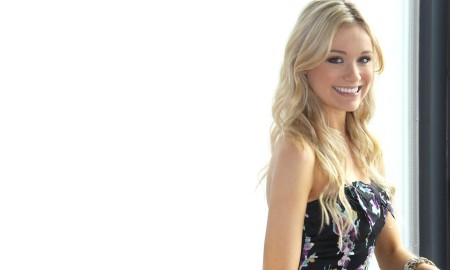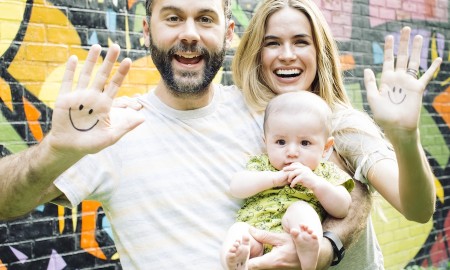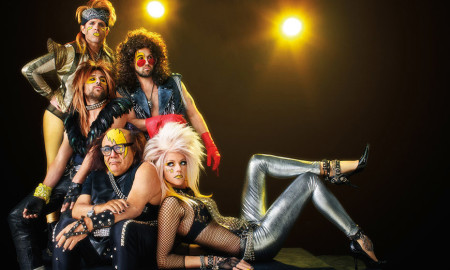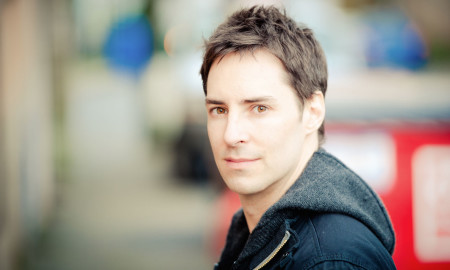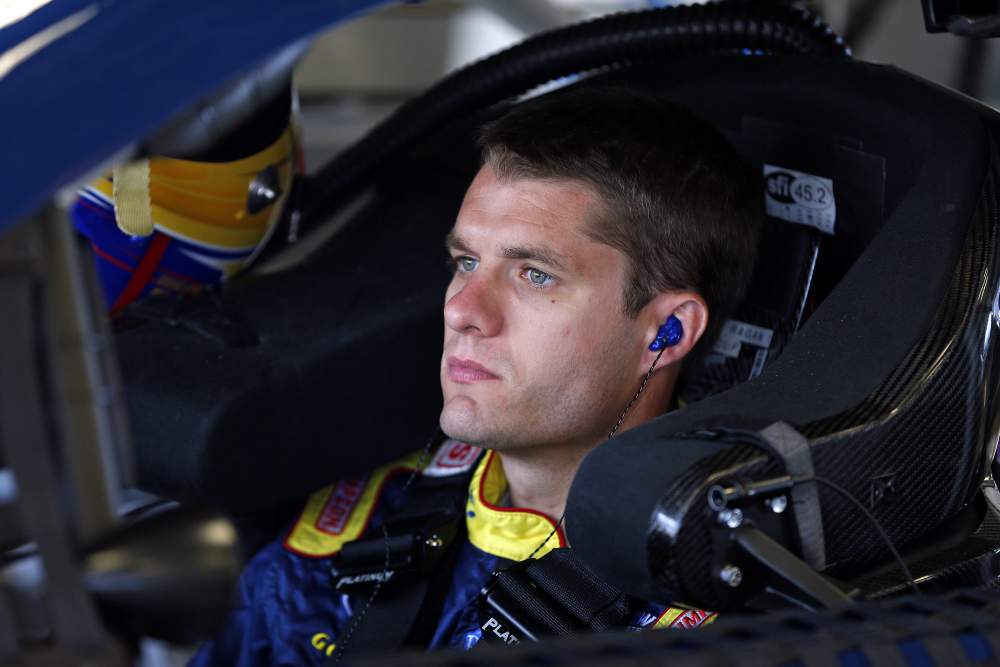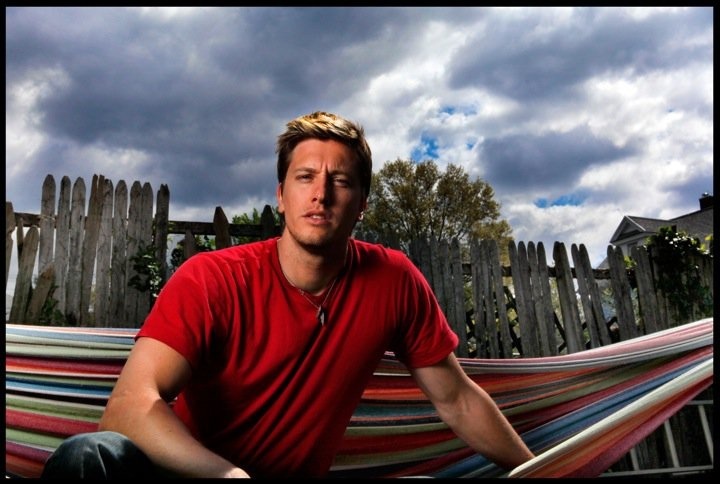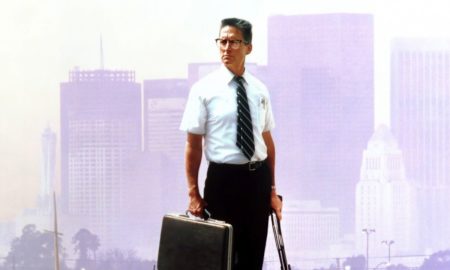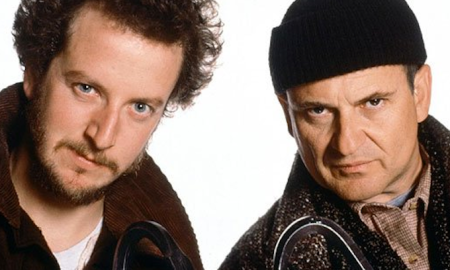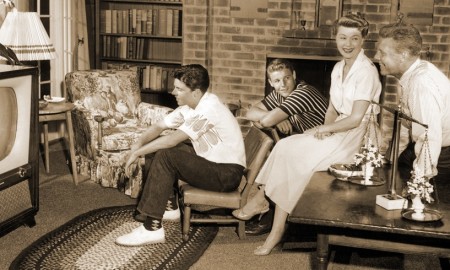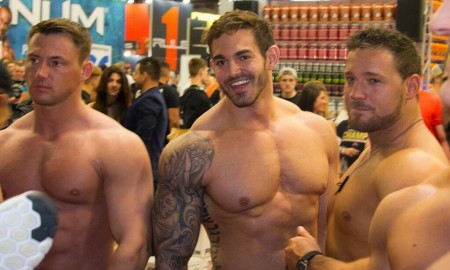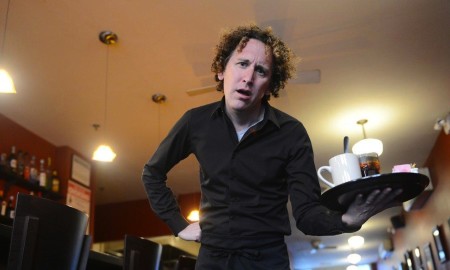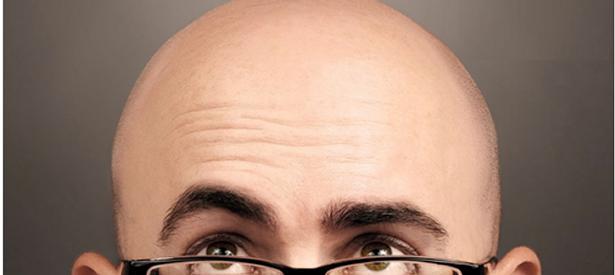

The Adam Carolla Show’s Bryan Bishop writes a bestselling memoir about his battle with a brain tumor — where shrinkage is actually a good thing.
Bryan Bishop, the cast member known to millions of Adam Carolla podcast fans as “Bald Bryan,” has written a memoir about life with an inoperable brain tumor. The book, called Shrinkage: Manhood, Marriage and the Tumor That Tried To Kill Me, refers to the procedure that would reduce the tumor’s threat while Bryan upped the stakes on his life, both personal and professional.
His relationship with Adam goes back a ways — Bryan was a call screener for the classic Loveline radio show, hosted by Adam and Dr. Drew Pinsky, pre-digital age. He currently keeps the conversation going with Adam on the groundbreaking, record-breaking podcast. He’s got a quick wit, a thing for movies (he’s often featured in a film review segment on the podcast called “Hooray For Baldywood”), and a love for sports, especially fantasy football. You also may have seen him on TV, when he won $100,000 on Who Wants To Be A Millionaire.
In 2009, during one of Adam’s podcasts, Bryan announced the tumor’s arrival. At the time, doctors gave him six months to a year to live, and the naysayers didn’t see much of a future in podcasting. Yet here we are, far into the future, with Bryan thankfully still with us and Adam’s podcast going stronger than ever.
Here, Bryan gives us the details on how a memoir about a tumor can become a New York Times bestseller.
A New York Times bestseller! Congrats! That’s not easy. Were you surprised that the book was received as well as it was?
I guess it was a surprise because I’m a first-time author and I have a small amount of notoriety – admittedly small. So of course I was incredibly humbled by the way the book was received.
At the same time, our fans are loyal and extremely enthusiastic. If they find something they believe in, then they are going to support it. They are pretty much 100% genuine. I put as much of myself as I could into this book, and people responded to it.
Yet the book was embraced by people who may not even know what a podcast is.
Initally the book is supported by fans of the show, or perhaps people who are looking for a cancer recovery memoir. Yet if the book is going to have any long-lasting life or success, it is going to be because people read it and responded to it or have people they know who would get something out of it.
What was it like to write about the process of battling a tumor?
It was very carthartic. At times, it was just emotional, just putting it into words or thinking about it. Yet it helped me put a lot of things into perspective and put a lot of things behind me that need to get put behind me.
I traveled up north to the San Francisco Bay area where my parents live and I interviewed them. That was an emotional time too for all of us, but I’m glad that we did it and I’m glad that we talked about things. It was helpful.
It’s hard to write about yourself or something that happened to you. Talking to friends, co-workers and family about how they were feeling, I certainly learned a lot about that. A lot of it I never knew and I wasn’t privy to. There were a lot of things that people did not want to tell me and didn’t want to burden me with.
Also, in talking to my doctors, I learned a lot about how close it came to being a really bad situation – it was a really bad situation, how close I came to losing the battle. I don’t think I really was aware of that at the time.
How is your health now?
Right now, I’m living with my shrunken tumor. It has shrunk quite a bit from the initial round of treatment. As long as it continues to not grow, I’ll live with it for the rest of my life and it will be something that is there but won’t affect me that much.
It’s like a diet, trying to lose those last five pounds. I’m trying to get the last 5% of my ability back from before my diagnosis. I do Pilates and go to the gym and I try to stress that. It’s a little-by-little recovery which I’ll always be working on.
All told, you seem to be a pretty optimistic guy. Yeah?
I tend to look at life in a glass-half-full kind of way. I can’t say that I was entirely responsible for my recovery but I think it had a lot to do with the way I recovered like I did.
Your wife, Christie, had much to do with your recovery as well. In what ways?
I would not be here today if it weren’t for Christie. She was my 24-hour-a-day caregiver during the worst of my treatment. I was doing so poorly that I couldn’t get to the bathroom by myself. She helped me do everything. She helped me get dressed. She helped me dry off after a shower.
She was a 29-year-old woman at the time, responsible for her own life, and she had a fiancé who needed her for everything. She did an incredible job of taking care of me and helping nurse me back to health. And that was just the physical stuff. She was so incredibly emotionally supportive. She’s a strong, strong woman and an amazing person. Anyone who reads the book will tell you that she’s the star of the story.
How about Adam Carolla? How did Adam take the news of your illness?
To his credit, he was always the same Adam that I always knew. Some people act differently around people who are sick, or cancer patients. Adam was the same old guy, and he wants to make sure that I’m doing well and that I’m taken care of. He’s a great guy and a good boss and a good friend.
You’re active with The National Brain Tumor Society. How rewarding is that experience?
They have a walk to raise money for brain tumor awareness and research. They asked me if I wanted to be their L.A. chairman for the walk, and I was honored. So many people have been so incredibly good to me while I was going through the worst of it; so much good energy and goodwill. I had an opportunity to pay that back. I jumped at the chance, and I’m now in my third year. I could not be more priviledged and more honored to be a part of it.
What is it about fantasy football that you love?
I love the social aspect of fantasy football, playing with your friends. And the competiton is fun. I love doing it because it involves a low level of gambling. You put your skills and your smarts to the test. And it’s football – what’s there not to love?
Movies are a big part of your many passions too.
We’re in the golden age of documentaries so there is always something interesting to watch and always something new coming up. It’s good to share the word and tell people about it.
The prices are a little bit out of hand [today], but from my perspective, I love going to movies. I love the theaters. I love the experience. From my point of view, it’s just getting better and better. Every theater I go to has stadium seating and the sound is better and the picture is better. It’s just an overall better experience.
Adam is currently successfully battling “patent trolls,” who are suing podcasters like Adam and accusing podcasters of stealing technology. How bogus. What’s your take on the case?
I really do think everything is going to work out. I don’t think they have much of a case. This is a pretty ridiculous open-and-shut situation. I don’t think they have much of a leg to stand on.
Read our interview with The Adam Carolla Show‘s other co-host, Alison Rosen, here!
Listen to The Adam Carolla Show here. It’s free!
Donate to the National Brain Tumor Society here

